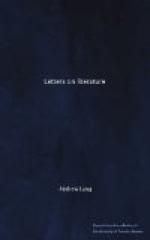“We gathered wood flowers,—some
blue as the vein
O’er Hero’s eyelid stealing,
and some as white,
In the clustering grass, as rich
Europa’s hand
Nested amid the curls on Jupiter’s
forehead,
What time he snatched her through
the startled waves;—
Some poppies, too, such as in Enna’s
meadows
Forsook their own green homes and
parent stalks,
To kiss the fingers of Proserpina:
And some were small as fairies’
eyes, and bright
As lovers’ tears!”
I wish I had room for three or four sonnets, the Robin Hood sonnets to Keats, and another on a picture of a lady. Excuse the length of this letter, and read this:
“Sorrow hath made thine eyes
more dark and keen,
And set a whiter
hue upon thy cheeks,—
And round thy
pressed lips drawn anguish-streaks,
And made thy forehead fearfully
serene.
Even in thy steady hair her work
is seen,
For its still
parted darkness—till it breaks
In heavy curls
upon thy shoulders—speaks
Like the stern
wave, how hard the storm hath been!
“So looked that hapless lady
of the South,
Sweet Isabella!
at that dreary part
Of all the passion’d hours
of her youth;
When her green
Basil pot by brother’s art
Was stolen away; so look’d
her pained mouth
In the mute patience
of a breaking heart!”
There let us leave him, the gay rhymer of prize-fighters and eminent persons—let us leave him in a serious hour, and with a memory of Keats. {5}
ON VIRGIL
To Lady Violet Lebas.
Dear Lady Violet,—Who can admire too much your undefeated resolution to admire only the right things? I wish I had this respect for authority! But let me confess that I have always admired the things which nature made me prefer, and that I have no power of accommodating my taste to the verdict of the critical. If I do not like an author, I leave him alone, however great his reputation. Thus I do not care for Mr. Gibbon, except in his Autobiography, nor for the elegant plays of M. Racine, nor very much for some of Wordsworth, though his genius is undeniable, nor excessively for the late Prof. Amiel. Why should we force ourselves into an affection for them, any more than into a relish for olives or claret, both of which excellent creatures I have the misfortune to dislike? No spectacle annoys me more than the sight of people who ask if it is “right” to take pleasure in this or that work of art. Their loves and hatreds will never be genuine, natural, spontaneous.
You say that it is “right” to like Virgil, and yet you admit that you admire the Mantuan, as the Scotch editor joked, “wi’ deeficulty.” I, too, must admit that my liking for much of Virgil’s poetry is not enthusiastic, not like the admiration expressed, for example, by Mr. Frederic Myers, in whose “Classical Essays” you will find all that the advocates of the Latin singer can say for him. These heights I cannot reach, any more than I can equal that eloquence. Yet must Virgil always appear to us one of the most beautiful and moving figures in the whole of literature.




